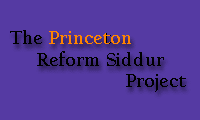
The word brachot (singular,
brachah) means "blessings." Brachot are a major
component of the Jewish liturgy, so much so that an entire tractate
in the Talmud is dedicated to them.
What are brachot? Brachot are responses:
Responses to the beauty, majesty, sadness, madness, love,
compassion, intensity and suffering in the world. They are moments
when we, as Jews, step back and acknowledge the immensity of
universe, of God's creation. They are a fixed element of Jewish
worship -- we say certain brachot everyday or at specific times,
like on Shabbat -- and they are spontaneous -- we say them whenever
we're moved to offer prayer.
Let's take a look at a brachah we say
every Shabbat over the Shabbat candles:

Blessed are You, Eternal our God,
Sovereign of the universe, You sanctify us with Your mitzvot, and
command us to light the Shabbat lights.
Because light is a symbol of joy and
peace, we light candles on Friday night as a way of setting the tone
of Shabbat. Additionally, fire can be used both creatively and
destructively. Traditionally, Jews do not make fire during Shabbat
because making fire is considered work. Shabbat does not actually
begin until after the candles are lit and the blessing is said.
Thus, the last act of work we perform during the week is a creative
act, one that helps us usher in the day of rest.
We say the Candle Blessing as a way of
acknowledging our own creative faculties and responding to God's
command to us to bring joy and peace to the world. It's also a way
of separating time. When we light the candles we make distinct break
from the workweek and begin Shabbat.
But brachot come in many shapes and
sizes. In traditional blessings for various foods, joyous occasions,
hearing of a death, beginning a journey and seeing a rainbow, for
example. Many of these follow a specific format: (1) They begin with
the statement: "Blessed are You" (2) then various names of God and
God's attributes (3) finally, an explanation of what triggered the
blessing. But not all blessings follow this formula. Take a look at
these:
Blessing Before Going to Sleep
Sleep decending,
on my lids,
on my limbs,
I call to mind
the gifts
of the days -
the gift
of this day -
and give thanks.
Wildpeace
Not that of a cease-fire,
let alone the vision
of the wolf and the lamb,
but rather
as in the heart after a surge of
emotion:
to speak only about a great weariness.
I know that I know how
to kill: that's why I'm an adult.
And my son plays with a toy gun that
knows
how to open and close its eyes and say
Mama.
A peace
without the big noise of beating swords
into plowshares,
without words, without the heavy thud of
the rubber stamp; I want it
gentle over us, like lazy white foam.
A little rest for the wounds--
who speaks of healing?
(And the orphans' outcry is passed form
on generation
to the next, as in a relay race:
that baton never falls.)
I want it to come
like wildflowers,
suddenly, because the field
needs it: wildpeace.
We've decided to begin the Siddur
Project by writing our own brachot which will be interspersed
throughout our siddur as inspiration. Write about something in your
life that moves you. Here's an example, but remember they don't have
to follow this format. Write what your heart moves you to write.
Blessed are You, God, Ruler of the
Universe, who has given me the strength to meet the challenges of
this day and the spirit to overcome them.
To begin writing, click here.
To read brachot written by other members of the Princeton Reform
Community,
click here.
|

